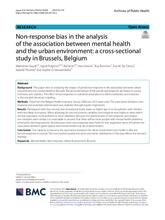Background
This paper aims at analysing the impact of partial non-response in the association between urban environment and mental health in Brussels. The potential threats of the partial non-response are biases in survey estimates and statistics. The effect of non-response on statistical associations is often overlooked and evidence in the research literature is lacking.
Methods
Data from the Belgian Health Interview Survey 2008 and 2013 were used. The association between non-response and potential determinants was explored through logistic regressions.
Results
Participants with low income, low educational levels, lower or higher age or in households with children were less likely to respond. When adjusting for socio-economic variables, non-response was higher in areas which are less vegetated, more polluted or more urbanised. Because the determinants of non-response and depressive disorders were similar, it is reasonable to assume that there will be more people with mental health problems among the non-respondents. And because more non-responses were found in low vegetation areas, the protective association between green spaces and mental health may be underestimated.
Conclusion
Our capacity to measure the association between the urban environment and health is affected by non-response in surveys. The non-random spatial and socio-economic distribution of this bias affects the research findings.



